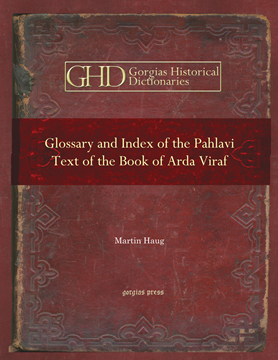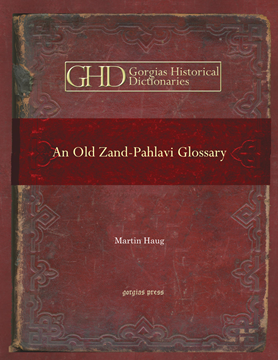Martin Haug
Glossary and Index of the Pahlavi Text of the Book of Arda Viraf
By Martin Haug
Series: Kiraz Historical Dictionaries Archive 18
ISBN: 978-1-59333-938-8
For the student of ancient Iranian documents, this time-honored source for using the sacred texts of the Zoroastrians, this glossary and index is an historical dictionary of an unusual sort. The materials from three works provide the basis for this glossary: the Pahlavi text of Arda Viraf, the tale of Gosht-I Fryano, the Hadokht Nask, and extracts from the Din-Kard and Nirangistan. All of these documents pertaining to Zoroastrian belief and practice are facilitated by this historic glossary. Based on the edition of E. W. West, the text was revised by Martin Haug. A work of scholarly erudition in the nineteenth century, this book, now difficult to find, has now claimed a place among Gorgias Historical Dictionaries.
$172.00 (USD)
An Old Zand-Pahlavi Glossary
Edited in the Original Characters
By Martin Haug
Series: Kiraz Historical Dictionaries Archive 16
ISBN: 978-1-59333-996-8
This historical dictionary contains an English translation of the Frahang-I Oim-evak, an antique Avestan and Middle Persian dictionary. A collaboration between Martin Haug and Destur Hoshengji Jamaspji, this rare glossary provides the Pahlavi translations for almost 900 Avestan words. Avestan is an Eastern Old Iranian language used by the Zoroastrian Avesta. It represents one of the earliest known Iranian languages. This dictionary was one of the earliest attempts to present the material to a western readership. Still considered a historic entry-point into the language, Haug’s glossary has become a rare find. Gorgias Press is pleased to bring it back into circulation as a part of our Historical Dictionary series.
$132.00 (USD)
An Old Pahlavi-Pazand Glossary
Edited with an Alphabetical Index
By Martin Haug
Series: Kiraz Historical Dictionaries Archive 15
ISBN: 978-1-59333-995-1
Originally compiled by Destur Hoshangji Jamaspji Asa, this historic dictionary was revised and enlarged by Martin Haug. This edition of the glossary represents the first time that the Pahlavî-Pâzand, or Saanian Farhang, was published in its ancient form and arrangement. The dictionary is of an Aramaic translation into Middle Persian, in Pahlavi script. A substantial introductory essay on Pahlavi begins the work; entries are translated into English, occasionally reaching substantial essays. A truly historic attempt to document a language far removed from many European and new world scholars, Haug has produced an indispensable historic dictionary.
$191.00 (USD)



